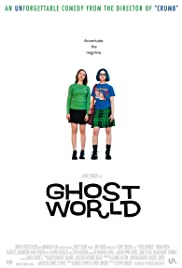
GHOST WORLD
US, 2001, 112 minutes, Colour.
Thora Birch, Scarlett Johansson, Steve Buscemi, Brad Renfro, Ilieana Douglas, Bob Balaban, Stacey Travis.
Directed by Terry Zwigoff.
While watching this film about two high school girls who graduate, see themselves as superior to everyone else and then try to fend for themselves, I kept wondering why it was called 'Ghost World'. The world portrayed seemed to be modern Los Angeles which one could hardly call ghostly. And the characters themselves seemed solidly real. Perhaps it was because the two girls didn't feel that they belonged to the real world. There must be something in a film when you spend time trying to fathom what the title means.
Next step was to the Media Kit. And an answer.
Perhaps it should be said first that the author of the material on which the film was based, Daniel Clowes, is a writer of comic books. This is his answer: 'I was once walking around Chicago in a really bad neighbourhood and in the midst of some really illegible graffiti, somebody had written 'Ghost World'. I thought at that time there was really something sort of beautiful about that - it struck me as having a really evocative, poetic quality. It had so many levels of meaning to me. The America we live in is disappearing, bulldozed under our feet and constantly rehabbed and remodelled. It also refers more personally to the characters and the friendships that they've lost'.
Yes. I think he's right. Documentary maker, Terry Zwigoff, was fascinated by Clowes' comic books and had himself made an award-winning film, Crumb, about cartoonist and illustrator, Robert Crumb. Zwigoff and Clowes worked together on the screenplay. They wanted to bring to life Enid and Rebecca, the comic books' two friends, who are united in mockery and disdain of everyone and everything they think beneath them. Enid, the leader, has set up a man she considers a 'loser' who has put an ad in the personals column. She humiliates him. But, as she watches him, she gets to know him, feel sorry for him and then learns something about life from him. Rebecca is more practical, is able to hold down a job, does not always understand Enid's malicious behaviour. When they finally manage to get their apartment to room together, everything has changed. They have to face adulthood in the real, mall-ridden, fast-food outlet, kitsch communities of Los Angeles.
Because of the girl's behaviour, especially that of Enid, the action is always slightly off kilter and requires constant attention by the audience to assess whether the girls are changing or not. What keeps audience attention are the performances. Thora Birch (the daughter of the house in American Beauty) is expertly alarming as the unpredictable Enid. Scarlett Johansson (the girl in The Horse Whisperer) is fine as Rebecca. Also well worth seeing is the performance of Steve Buscemi as Seymour, the loser LP collector, who is both attracted to and bewildered by Enid.
So many films about teenagers coming out of the United States are raucous sex comedies of the American Pie variety. Ghost World is the opposite, a serious look at teenage alienation and wilfulness. Obviously, it has a lot of the behaviour that parents and adults find exasperating. But, in its comic book way, it asks us to respond emotionally to the characters and to think about them.
1. The title? The writer’s comment about the graffiti and the American city as a ghost world?
2. The American city, Los Angeles style, streets, diners, apartments, art school…? The musical score and songs?
3. The basis in a comic book, amplifying the comics, characters, situations, dialogue?
4. The tone of the story, of Enid and Rebecca, sardonic, superior, mockery, teenage attitudes, possibilities for change?
5. Edited Rebecca, the performances, teenage, having completed school, the celebration of the graduation, the two girls above the celebration, the mockery of the speaker and her religious fervour? Prospects in life, find an apartment, share? Jobs? For the summer?
6. Enid, her age, Thora Birch’s performance, her look, severe, the glasses, the black hair, her dresses? Her comments? Her hopes, the later sequence with her father and his weakness? Her friendship with Rebecca, together, their observations on a wide range of people?
7. Enid going to art school, the students, the enthusiasm of the teacher, comments, getting the picture of the chicken, the past attitude of the Coon chicken franchise, the races? The exhibition, the comments of the teacher, putting it on show, borrowing it from Seymour? The reaction of the school, the teacher, failing Enid, discussions with the teacher, regrets?
8. The situation with Seymour? Seeing the advertisement, prank, the phone call, the date, the two girls with Josh watching him, ridiculing him? Watching him selling the LPs? Enid buying one? Going to his home, his collection? Seymour and his life, going to a psychologist, working as a manager in the chicken franchise business? Dana as the recipient of his calls? Possibilities in his life?
9. Enid, visiting Seymour, the time together, talk, the records, sharing, getting him to ring again, yet her jealousy, the visits, Dana’s reaction, drinking with him, the one night together, the effect on each of them?
10. Seymour, going to see Dana, breaking up? The visit to the psychologist? Getting his life in order?
11. Rebecca, shopping, with the boys, on a different path from Enid? Josh and his place, ‘Weird’, the break between the two girls?
12. Norman, the old man, sitting at the bus, the bus going nowhere? Then its arrival, Norman going? Enid going to the bus – going where? (The writer and his mentioning that a number of people interpreted this is suicide?)